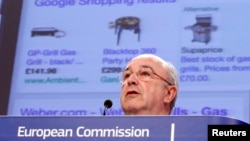Internet search engine Google has settled an antitrust case with the European Union, agreeing to give its rivals' search results comparable display to that of its own.
The EU case against the giant U.S. company has lasted more than three years.
Regulators charged that when Google users in Europe searched for products and services, the company exclusively displayed pictures of merchandise from Google advertisers.
But Wednesday EU antitrust chief Joaquin Almunia accepted what he called "far-reaching" concessions from Google. He said that if the deal is eventually adopted by the European Commission, Internet users searching through Google for hotels, restaurants and other products would also see "comparable" results from three of Google's rival search engines.
He said Internet users would be provided "real choice between competing services."
Google rivals, including U.S.-based Microsoft and Finland's Nokia, attacked the settlement, saying it would still leave them at a competitive disadvantage. The rivals would still have to pay for their advertising placement through an auction.
The U.S. Federal Trade Commission investigated a similar antitrust case against Google last year but took no action.
The EU case against the giant U.S. company has lasted more than three years.
Regulators charged that when Google users in Europe searched for products and services, the company exclusively displayed pictures of merchandise from Google advertisers.
But Wednesday EU antitrust chief Joaquin Almunia accepted what he called "far-reaching" concessions from Google. He said that if the deal is eventually adopted by the European Commission, Internet users searching through Google for hotels, restaurants and other products would also see "comparable" results from three of Google's rival search engines.
He said Internet users would be provided "real choice between competing services."
Google rivals, including U.S.-based Microsoft and Finland's Nokia, attacked the settlement, saying it would still leave them at a competitive disadvantage. The rivals would still have to pay for their advertising placement through an auction.
The U.S. Federal Trade Commission investigated a similar antitrust case against Google last year but took no action.
